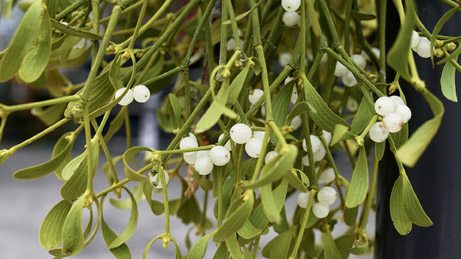The Effects and Benefits of Mistletoe Therapy

Mistletoe (Viscum Album) is a plant that lives on trees, such as apple, oak, maple, elm, pine, and birch. It is native to Europe and Western Asia. Viscum album has been used for centuries. Brand names for this plant include Helixor®, Iscador®, Iscador Qu®, Lektinol™, Cefalektin®, Eurixor®, ABNOBAviscum® and Abnoba-viscum Quercust. Mistletoe is given either through subcutaneous injection or intravenously. The extracts of this plant, specifically the one that grows on pine trees, are currently being studied in cancer patients. In clinical studies, mistletoe has been demonstrated to be safe and effective along with conventional treatment such as chemotherapy and radiation.
Mistletoe therapy has been studied and used at top level cancer research centers such as Sloan-Kettering Cancer Institute in John Hopkins, among just a few. In addition to stimulating the bone marrow it may be used to decrease side effects of chemo and radiation.
In our complimentary and integrative oncology center, attention is devoted principally to the aspects of quality of life, prolonging survival, and preventing relapse.
Mistletoe at Work in the Body
The body’s own defenses are strengthened by mistletoe therapy in such a way that beneficial granulocytes, lymphocytes, and natural killer cells increase. Any degenerated cells still found in the body can therefore be combated and the risk of metastatic spread reduced.
Mistletoe therapy can improve the immune system weakened by surgery, anesthesia, radiotherapy, and chemotherapy in its role against cancer. A healthy immune system, i.e. one which reacts in a variety of ways, makes relapses less likely.
Mistletoe therapy can reduce, or make more bearable, the pain which can occur in advanced stages of tumors by stimulating the release of endorphins. Endorphins are natural morphine produced by the body which has a pain-relieving action.
The loss of appetite and the disturbed sleep pattern that frequently occur in association with a cancer disease can be eliminated or alleviated. Healthy eating and sleeping behavior should not be underestimated as a precondition for long-term recovery. This also applies to the reduced susceptibility to infectious diseases that can be observed during mistletoe therapy.
It has been shown in several studies that mistletoe injections have a protective effect on the DNA of human cells. This also explains the improved tolerance of chemotherapy or radiotherapy during mistletoe therapy.
A direct anti-cancer effect Viscum album has on tumor cells has also been demonstrated. Cytotoxic effects, i.e. which destroy cells, are exerted in particular by the lectins and viscotoxins contained in mistletoe.
Therapeutic Effects of the Ingredients of Mistletoe
Mistletoe preparations use the whole plant or the specific composition of active substances in the plant as the basis for their therapeutic effect. However, some manufacturers concentrate their efforts solely on one ingredient, the lectin content of mistletoe. Because of the wide variety of specific types, it is important to see a professional trained in the use of mistletoe.
Because mistletoe is a plant derived drug, strong preparations can only be obtained by prescription and are not to be used without medical supervision. Side effects, however, are typically minor.
Viscotoxins and lectins are two of the most important extracts of mistletoe. Viscotoxins cause tumor cell death, by poisoning the cell. Lectins act on the cell nucleus where they cause an apoptotic reaction of the cell. Apoptosis refers to degradation of all the cell components, comparable to natural cell death. At present, four groups of mistletoe lectins are known.
Mistletoe can help regulate the immune system. In this way, the immune system can be stimulated as a whole, non-specifically or specifically, in its capacity to deal with diseased cells or foreign substances. The nonspecific reactions, which are inherent in the immune system, include a marked increase in leucocytes in the blood.
If you are interested in learning more about mistletoe therapy, please contact our office: (303) 884-7557.

